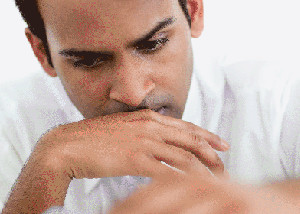Anxiety, along with mental health problems in general, is a major concern with 1 in 4 experiencing such problems each year

While the overall number of mental health problems in the UK is not rising, self harm and suicidal thoughts are. How people cope with mental health problems appears to be getting worse.
Anxiety can be a normal response to life’s stresses, but for some it is overwhelming and coping becomes a real problem. Your genes, personality, grief, marital problems, stress, money or work worries, and many more play their role. Factors, which may not appear to be so directly related, such as mobile phone usage and EMF exposure, sugar consumption, shallow breathing, lack of exercise, processed food and food additives, bowel health and nutritional deficiencies are also important to consider.
While life’s events may be out of your control, there is a lot you can do to minimize the effects of stress and to lower anxiety levels by addressing the things that can be corrected.
ANXIETY PRESENTS IN MANY DIFFERENT WAYS
There is such a long list of different labels for types of anxiety, from post traumatic stress to panic attacks, and OCD for example. Many people who come and see me in consultation have a generalized anxiety, such as worries about the future, health, finances, loved ones, or just a constant worry that something might happen.
Here is a breakdown from a survey (see footnote) in 1996, of how prevalent some mental health conditions are today:
Generalised anxiety disorder: 5.9 in 100 people
Depression: 3.3 in 100 people
Phobias: 2.4 in 100 people
Obsessive Compulsive Disorder (OCD): 1.3 in 100 people
Panic disorder: 0.6 in 100 people
Post traumatic stress disorder (PTSD): 4.4 in 100 people
Mixed anxiety and depression: 7.8 in 100 people
NUTRITIONAL DEFICIENCIES CAN UNDERLIE OR EXACERBATE ANXIETY
One of the key areas I focus on when someone comes to see me with anxiety is there nutritional status. Someone who is armed with optimum levels of specific nutrients, in my experience, will have a much better time warding off anxiety symptoms and coping with stress. If your body is strengthened nutritionally, this will help to build resilience against the effects such traumas have in your life. Conversely, if your body is rundown or nutritionally imbalanced this can open the door much wider to a condition like anxiety, allowing it to create an effect in a person’s life.
Anxiety can be greatly helped by giving the nutritional tools and equipment the body needs, supporting the nervous system, adrenals, and applying natural medicines that can help treat how a person feels mentally and emotionally.
ALTERNATIVE TREATMENT FOR ANXIETY
Optimizing nutritional status is done through vitamin and mineral supplementation. B vitamins, Vitamin D, magnesium, among others are key things I will look at.
Homeopathy is another natural medicine I will often use in the case of anxiety. The beauty of homeopathics in such cases is that they can be matched very exactly to the symptoms people are experiencing. There are literally hundreds of homeopathics for anxiety, and finding the one that suits your constitution as well as the symptoms being experienced is the key.
Herbs can also be very useful in alleviating feelings of anxiety.
Lifestyle factors are also very important to address, from diet and exercise, to time outside in the fresh air and screen time exposure.
CONSCLUSION
While the prevalence of anxiety and general health problems is high, by systematically addressing the underlying contributing factors, a person can experience major change for the better.
FOOTNOTE: McManus S, Bebbington P, Jenkins R, Brugha T. (eds.) (2016). Mental health and wellbeing in England: Adult psychiatric morbidity survey 2014. Leeds: NHS digital.


